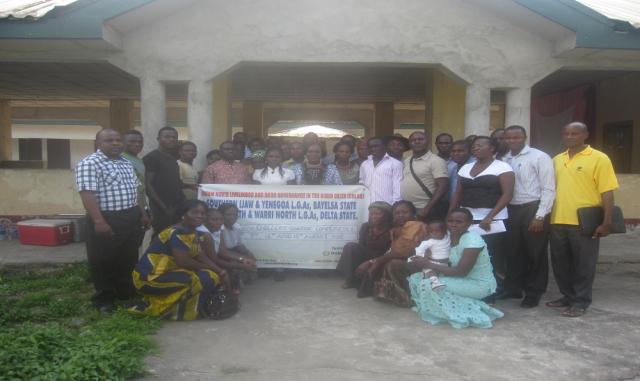
As part of LITE-Africa’s implemention strategy of the Oxfam Novib funded project, “On Livelihood and Governance (ONLAG), Stakeholders’ Policy Dialogues were held in Four (4) Local Government Areas (Southern Ijaw, Yenegoa, Isoko South and Warri North) in Bayelsa and Delta states on the 7th, 9th, 14th and 15th of August, 2012 to strengthen the capacity of local community women and men to achieve 30% women’s participation in community level decision making and governance and share findings of the 2012 Citizen Report Card (CRC) on Governance, Gender and Livelihoods in the Niger Delta.
The dialogues took place at the various local governments’ headquarters in Oleh, Koko, Yenegoa and Oporoma with turnout of both males and females representatives from the communities, State and Local Governments officials, Civil Societies Organization and the Media. During the conference, presentations were made on Overview of Local Governments Operations and Activities, Women inclusion process and structures, Role of women in Leadership and Peacebuilding, Government Policies, Programmes and Operations. Also, summary of findings of the CRC on Governance, Gender and Livelihood in the Niger Delta was presented to participants. The findings of the CRC included but were not limited to the following;
Gender and Governance: The report reveals that in the 20 communities, women participation in decision making or involvement in local governance is low.
Infrastructural and Development Projects: The CRC identified a total of 78 abandoned, incomplete and sub standard projects; where 53% of them were projects sponsored of funded by State Government, 19% by Oil companies, 18% by Federal Government and 10% by Local Government, International Organizations and Community efforts.
Education: The report reveals that 19 of the 20 communities have primary schools while 16 0f the 20 communities have secondary schools. 44% of all primary schools and 58% of secondary schools do not have desks and chairs for pupils and students. Other basic amenities such as toilets and libraries are also lacking in the schools.
Health: The report also reveals that only 10 of the 20 communities have functional health care facilities.
Public Electricity, Drinking Water and Sewage: Also revealed in the report is that 30% of the communities in one of the LGAs (Southern Ijaw) do not have any source of public electricity, whereas 40% of respondents in Warri Noth LGA aligned with Southern Ijaw. On Water Sewage, 50% of the respondents stated that their drinking water is not safe and 70% stated that human waste floats back into their communities during the rainy season.
Far reaching recommendations (Communiqués) were made on how to strengthen the relationship between government and the people and mainstream women into local governance by participants. Below is a sample of the communiqué.
COMMUNIQUE ISSUED AT THE END OF A 1 DAY STAKEHOLDER POLICY DIALOGUE
HELD AT ISOKO SOUTH LGA, DELTA STATE, 7 AUGUST 2012
Preamble
1) LITE-Africa implemented the Livelihood and Governance Programme in 10 communities of Delta State and 10 communities of Bayelsa State. The programme began in October 2009 and will close in September 2014. The implementation was based on two strategic change objectives including: Increasing sustainable livelihoods through strengthening current livelihoods and identifying potential ones; and strengthening local governance structures through increasing participation of women and youth in the process of governance.
2) Leadership Initiative for Transformation and Empowerment (LITE-Africa) hosted a one day Stakeholder’s Policy Dialogue in Oleh as part of its Oxfam Funded, Livelihood and Governance Programme (ONLAG). The Dialogue is the only formal dialogue held as part of ONLAG.
3) The dialogue was attended by Local Government Representatives, Ministry of Women Affairs representatives, community leaders and community members, largely project beneficiaries.
4) The Stakeholder’s Policy Dialogue involved a discussion on gender mainstreaming in community governance structures and strengthening community and government relationships to improve services delivery. This discussion resulted in this communiqué
Key Concerns
The presentation and deliberations generated the followings concerns:
1. For over a decade, women participation in decision making process at all levels of governance has attracted major attention, both at local and international fora. There is an increasing consensus on the need for a more proactive and community based approach to finding lasting solutions to the lingering problem of women’s marginalization in Nigeria, especially in the Niger Delta region of Nigeria. Because of this feminization of poverty, women are finding it difficult to be able to break this chain and be able to participate in decision making processes.
2. Communities are not consulted on development budget allocations, such as the Constituency Development Fund. This results in a series of substandard development projects and poor service delivery. Resolutions The participants resolved as follows:
1. Women should be encouraged to go to school to acquire education.
2. Women should not shy away from leadership positions
3. Women should regard themselves as role models in the society
4. Women should learn how to be outspoken and voice out their concerns
5. Community constitutions should make provisions for women participation in decision making
6. Government should recognize that women are part of the society and should appoint them in official positions
7. Communities should cut off various cultural ties that limit women from participating in community decision making.
8. Government should endeavor to send delegates to the communities on issues affecting the community
9. Government should organize workshops and seminars periodically to enhance the capacity of local decision makers on issues of governance
10. Communities should embark on peaceful demonstration to voice out their concerns instead of taking up arms or to be violent
11. Government should have a functional monitoring/supervision on projects in communities
12. Communities should vote credible leaders into elective positions
